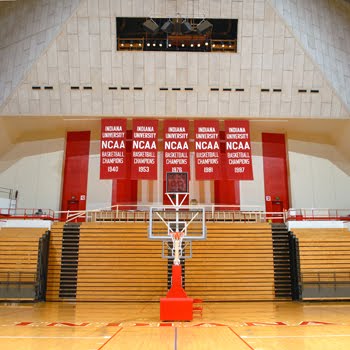Longtime South Beach Hoosier favorite and Pulitzer Prize winner Anne Applebaum shoots and she scores!
Anne's past amazing OpEd columns are available at: http://www.washingtonpost.com/wp-dyn/content/linkset/2005/03/24/LI2005032401432.html
____________________________________________
http://www.washingtonpost.com/wp-dyn/content/article/2007/04/16/AR2007041601421_pf.html
The Washington Post
Two Protests, One Sign of Hope
By Anne Applebaum
Tuesday, April 17, 2007
And now, alert readers, it is time for a test: Here are two demonstrations, representing two political movements, that took place recently in two neighboring countries. For which country should fans of "democratization" cheer loudest?
Example No. 1: This demonstration took place in Moscow on Saturday. More precisely, it took place in Pushkin Square, legendary site of Soviet-era dissident protests. Some 2,000 to 3,000 people came to show their opposition to the Kremlin -- and they were greeted by some 9,000 club-wielding riot police officers. About 200 people were arrested, including Garry Kasparov, the former world chess champion who was described in the Russian newspaper Pravda as "a political pawn who has sold his soul to the traitors who plot Russia's demise." Later, Kasparov was charged with "shouting anti-government slogans in the presence of a large group of people."
Example No. 2: This demonstration began in Kiev some days ago and continues. More precisely, it is taking place in the Maidan, also called Independence Square, the legendary site of the Orange Revolution protests of 2004. The organizers are the anti-Orange, pro-Russian "Party of the Provinces." Their goal is to prevent Ukrainian President Viktor Yushchenko from calling new elections. At their zenith last week, the protests attracted between 35,000 and 70,000 people, depending on whose estimate you prefer. They were not attacked by riot police. No one has been arrested.
Now, there are some inherent difficulties in judging the merits of these demonstrations, particularly if you are looking, as we Americans love to do, for good guys and bad guys. For it is true that the Russian demonstrators are, in their own words, fighting for freedom of speech, the press and association; that they oppose President Vladimir Putin's increasing authoritarianism; and that they deplore his virtual elimination of political opposition. It is true that there are worldly, well-connected, well-known English-speakers in their ranks. It is also true that they enjoy very little popular support, in part because the Russian media portray them, as the newspaper Izvestia did, as a tiny group of malcontents, probably paid from abroad, who deliberately provoked a fight with the peaceful authorities.
The Kiev demonstrators, by contrast, oppose the Westernization of their country, dislike the idea of Ukraine growing closer to NATO and the European Union, and generally wish for a return to the days when their country was a client state of Russia. Most of their supporters are provincial, not so well connected and probably don't speak English. There are no world chess champions among them. Nevertheless, they do enjoy an important measure of popular support: Although it does seem that their demonstration isn't nearly as much fun as the Orange Revolution was -- one observer described the demonstrators as "silent, poorly-dressed throngs of mostly younger men shuffling along Hrushevsky Street under blue flags" -- their leader, Viktor Yanukovych, is in fact the elected prime minister of his country, and they did vote for him in democratic elections.
It's a tough choice, I know: Intuitively, one wants to see brighter prospects for democracy in Russia. The Russian opposition is brave, its cause is admirable, and its members and methods are familiar. Unfortunately, the opposition's protest is not evidence of democratization in Russia but rather of its absence. The truth is that the Russian authorities have, through censorship, intimidation and even murder, largely eliminated genuine political debate in their country. As the police reaction to Saturday's demonstration in Moscow well illustrates, even the tiny number of people who want to maintain some kind of public presence outside the mainstream must now be prepared to encounter violence.
By contrast, Ukraine, though frequently condemned as a disorganized political basket case, does slowly seem to be transforming itself into a country where people can at least choose from two clear political options, after a more-or-less open debate. President Yushchenko's decision to call for new elections is indeed controversial. However, it is being examined by the Ukrainian Constitutional Court, and all sides have agreed to abide by the court's conclusions. Prime Minister Yanukovych's call for demonstrations in Independence Square was a stunt. However, the stunt was legal, nonviolent and one that he has every right to try.
To put it crudely, overly simply and in language everyone can understand: Ukraine, for all of its multiple faults, is a free country in which anti-democratic forces can demonstrate. Russia remains an authoritarian country in which democratic forces are beaten up and arrested.
Myself, I wish the Russians luck -- but at the moment, I'm cheering loudest for Ukraine.
applebaumanne@yahoo.com
Tuesday, April 17, 2007
Wash. Post editorial aims right at Putin; "Kremlin Rising" revised paperback edition

http://www.amazon.com/Kremlin-Rising-Vladimir-Putins-Revolution/dp/1597971227/ref=sr_1_1/103-9239512-0805433?ie=UTF8&s=books&qid=1176790367&sr=8-1
IF South Beach Hoosier were still living in Washington, he'd have made it his business to be at this event last Thursday on the beautiful but cold Georgetown campus that he once knew so well:
"Washington Post reporters Peter Baker and Susan Glasser discuss the revised, paperback edition of Kremlin Rising: Vladimir Putin's Russia and the End of Revolution at a reception at Georgetown University, Old North, Room 205. To RSVP for this event, sponsored by the Center for Eurasian, Russian, and East European Studies, call 202-687-6060 or e-mail ceres@georgetown.edu. "
I first saw Susan Glasser in action during the summer and fall of 1992 when she and I were both working at Roll Call Newspaper on Capitol Hill, albeit, in two very different capacities: Susan in front of the scenes and myself behind.
I've closely followed her career ever since, and read her and her husband Peter's book twice now from cover-to-cover, as well as taped and re-watched their fascinating July 2005 appearance on C-SPAN's Book TV, which never fail to elicit buzz from not only serious foreign policy types -since they can go toe-to-toe with any wannabe Russian experts using facts, anecdotes or penetrating insight as their weapons- but with relative Russian novices as well, who are never sure who the various 'players' are.
See Wilson Center's http://www.wilsoncenter.org/index.cfm?fuseaction=events.event_summary&event_id=101670
Anyone who follows Russia as closely as I do, much less, even casually watched Charlie Rose's various shows on Russia under the iron hand of Putin's brand of authoritarian crony capitalism over the past 18 months -see the three below- is NOT at all surprised by what's happened, as Susan and Peter accurately forecast it while they were still in Moscow, seeing it with their own eyes, even if not always quite believing what they were really hearing and seeing, never more so than with what they saw for themselves in the Beslan school massacre.
Charlie Rose - Garry Kasparov and Stephen Cohen / Francis Collins
Buy $0.99 - Charlie Rose Inc. - 57 min - Jul 25, 2006 -
Segment 1: A discussion about Vladimir Putin and Russian politics with chess champion Garry Kasparov, Chairman of the United Civil Front of Russia, and ... http://video.google.com/videoplay?docid=-1553248045989563785
Charlie Rose - Gaza / Muslims and the West / Stephen Cohen on Russia
Buy $0.99 - Charlie Rose Inc. - 57 min - Jun 28, 2006 -
http://video.google.com/videoplay?docid=-9022691433457056364
Charlie Rose - Annette Bening & Ryan Murphy / Brian Cox / Robert Amsterdam
Buy $0.99 - Charlie Rose Inc. - 57 min - Oct 27, 2006 -
... Segment 2: Brian Cox discusses his work in the film "Running with Scissors". Segment 3: We conclude with Robert Amsterdam, attorney for Mikhail Khodorkovsky. http://video.google.com/videoplay?docid=-6122313171658656260
The Robert Amsterdam interview is especially powerful!
See http://www.robertamsterdam.com/Charlie_Rose_transcript.doc.
A few months ago, before I started this blog, finding myself increasingly agitated by what I was seeing, hearing AND reading, I wrote some insightful friends around the country the following:
"Recognizing China & Russia for what they are, and not as we'd like them to be, is a long-overdue message that's been sorely absent in Washington for the past few years, both in the press and on Capitol Hill.
As someone who's attended literally hundreds of House and Senate Foreign Affairs Comm. hearings over the 15 years I lived in the DC area, under both the late Dante Fascell, Lee
Hamilton -both of whom represented me in Congress over the years- and Henry Hyde on the House side, and Claiborne Pell, Jesse Helms, Richard Lugar and Joe Biden on the Senate side, the wishful thinkers have long held more sway than you'd think would be the case under Republicans, but because of strong agricultural interests, i.e conservative Doug Bereutter of Nebraska and liberal Jim Leach of Iowa, and the role of Archer Daniels Midland and ag equipment manufacturers like John Deere, there was seldom a handy stick to accompany the obligatory carrot.
Yet to me, this rarely gets the sort of attention it deserves outside the DC, Boston and NY foreign policy axis.
I've longed to see a Russian-oriented version of former Los Angeles Times Beijing bureau chief James Mann's excellent, The China Fantasy: How Our Leaders Explain Away Chinese Repression.
http://www.amazon.com/China-Fantasy-Leaders-Explain-Repression/dp/0670038253
(See also http://www.atimes.com/atimes/China/IC17Ad01.html
Mr. Mann is now trying to pound some sense into foreign policy students at one of my favorite places in all of Washington, where I've been informed and entertained for many dozens of hours in equal measure: SAIS, The Paul H. Nitze School of Advanced International Studies of The Johns Hopkins University, one of the nation's leading graduate schools devoted to the study of international relations
http://apps.sais-jhu.edu/faculty_bios/faculty_bio1.php?ID=269i )
The only exception to this has been the great book by the Washington Post's former Moscow
co-Bureau Chiefs, Susan Glasser & Peter Baker, who are married. (I first met Susan when she and I were both toiling at Roll Call in '92.)
She is clearly one of THE smartest and most perceptive persons I've EVER met, and she is great with context & detail, my own favorite bread & butter. And can she ever tell story...
The real question is why someone prominent in Washington -other than Tom Friedman- hasn't said this before and more emphatically.
There've been a few people at some recent Brookings' events I've caught -and taped- on
C-SPAN, who've come close to saying this, but they always stop just short of the line I personally want to see crossed.
See http://www.brookings.edu/comm/events/20060724_iran.htm specifically, Carlos Pascual. Transcript at http://www.brookings.edu/comm/events/20060724iran.pdf
Frankly, at times like that, I can't help but wonder if they self-mute because they want to be able to continue to visiting those countries in the future.
Pols, of course, would have no such excuse.
See also transcript of Washington Post business columnist Steven Pearlstein's online discussion of the Russian energy industry and investments in Russia.
http://www.washingtonpost.com/wp-dyn/content/discussion/2006/06/27/DI2006062700663.html
As for those well-intentioned ads that keep airing on CNN, asking President Bush to get international troops to Darfur, Sudan, they'd be more accurate and effective if they actually called out the two people who are using their veto threats to prevent it from happening,
namely Putin and Hu."
In my opinion, this morning's Post editorial on Putin gets it just right.
http://www.washingtonpost.com/wp-dyn/content/article/2007/04/16/AR2007041601436.html
___________________________________________
Editorial
The Washington Post
Pushkin Square Crackdown
Why is Vladimir Putin so afraid of a few thousand dissenters?
Tuesday, April 17, 2007
IN THE DAYS of Mikhail Gorbachev and glasnost, Pushkin Square in central Moscow was the site of historic rallies protesting repressive Soviet rule. On Saturday, international chess champion turned opposition leader Garry Kasparov sat in a Russian lockup after trying, unsuccessfully, to march on the historic square. Joining him in jail were 200 other dissenters. The next day, authorities picked up an organizer of a rally in St. Petersburg before she could even join her compatriots, 120 of whom were also arrested. Their crimes? Attending an unauthorized protest, violating traffic laws or -- the most farcical -- making "anti-constitutional" statements.
Other Russia, an umbrella organization of the country's disparate anti-Kremlin opposition groups, has been organizing such demonstrations in cities across Russia over the past few weeks, despite government efforts to stop them. Last weekend's protests were to be the most prominent yet, occurring in the country's two largest cities. In the end, about 2,000 people showed up in Moscow on Saturday -- to be greeted by 9,000 police and Interior Ministry officers. Another 3,000 attended Sunday's demonstration in St. Petersburg. In both cities, Russian authorities beat groups of protesters with clubs.
Ostensibly, President Vladimir Putin remains popular in Russia. He has presided over impressive economic growth. So why is he so frightened, so unwilling to allow a few thousand opponents to peaceably assemble in central Moscow? The answer ironically may lie in his success at choking off freedoms in his country. The media have been muzzled, and many local elections have been eliminated; the normal mechanisms for people to express their desires and complaints in a healthy society are gone. As a result, to gauge public sentiment Mr. Putin is left with little but the reports of his old colleagues in the former KGB, and that may encourage a tendency toward paranoia.
U.S. and European leaders have responded with varying degrees of indignation to the disturbing images of truncheon-wielding police thrashing unarmed students. White House spokeswoman Dana Perino called the Russian authorities' reaction "heavy-handed" and "unacceptable," while a State Department spokesman said, "It raises a question about whether or not those opposition parties, those opposition figures are able to freely and peacefully express their opinions in the context of contested elections." Unfortunately, it does not raise that question; it provides a sad and obvious answer.
____________________________________________________________
See First Chapter of hardback edition of Kremlin Rising at:
http://www.nytimes.com/2005/07/17/books/chapters/0717-1st-baker.html?ex=1176955200&en=20f6a319035f7a85&ei=5070
____________________________________________________________
http://query.nytimes.com/gst/fullpage.html?res=9B05E0D6163DF934A25754C0A9639C8B63
New York Times Book Review
July 17, 2005
A Modern K.G.B. Colonel
By ANDREW MEIER
KREMLIN RISING Vladimir Putin's Russia and the End of Revolution.
By Peter Baker and Susan Glasser. Illustrated. 453 pp.
A Lisa Drew Book/Scribner. $27.50.
DURING the darkest days of Vladimir Putin's war in Chechnya, the press briefings in Moscow were growing ugly. Instead of offering even the most minimal information from the war zone, the Kremlin was chastising journalists in public -- at times by name. A group of correspondents, Western and Russian, contemplated a boycott. A plea circulated by e-mail. One reporter, a longtime Moscow resident with a European passport, shot back a blunt reply: ''We can only do one thing -- remind our readers that Putin is intent on building a semi-authoritarian regime that's prepared to kill its own citizens to stay in power.''
''Kremlin Rising: Vladimir Putin's Russia and the End of Revolution'' echoes that dismal judgment. Peter Baker and Susan Glasser, a husband-and-wife team who for nearly four years between 2001 and 2004 served as Moscow bureau chiefs for The Washington Post, have written -- thanks to an unrivaled compilation of fact and analysis -- the official record of the Putin era, or as close to one as Western readers are likely to get. ''Kremlin Rising'' is the chronicle of ''the rollback'' -- the years in which a former lieutenant colonel in the K.G.B., dispatched to the backwater of Dresden under Mikhail Gorbachev, rose to become a would-be post-Soviet czar, and presided over ''a newly assertive Russia, rejecting international loans instead of defaulting on them, glorifying its lost empire rather than exulting in the downfall of dictatorship.'' It has been a time, the authors tell us, of a Russia eager to rise again, when ''nationalism mixed with Soviet-era symbolism was the perfect balm to the collective bruised ego.'' In these days, ''managed democracy'' -- the triumphant euphemism of Putin aides -- has become more than a slogan.
Baker and Glasser's indictment is a fugue on a single theme, state-sponsored malfeasance. Whether the subject is the takeover of the independent NTV television network; the school siege in Beslan that left at least 330 dead, more than half of them children; the prosecution of the oligarch Mikhail Khodorkovsky and the takedown of his Yukos oil giant; arms sales to Iraq; oil vouchers from Iraq; or oil deals rigged to benefit state-owned companies, the same notes are played: falsification, fraud, indifference, neglect, deception, disinformation, manipulation, corruption, thievery and lying -- all undertaken in the name of the state. Nonetheless, if this gloomy picture is fundamentally a true one, important shadings sometimes get lost.
Baker and Glasser came to Russia from Washington as veteran political reporters. They took part in the coverage of the Monica Lewinsky scandal and Bill Clinton's impeachment. Few of their predecessors had arrived in Moscow with sharper inside-the-Beltway reportorial tools. Yet their American experience contained a danger: a readiness to scrub Russian politics of its contradictions. So they give us a restoration drama in primary colors, a battle between ''Western-style liberal democracy'' and ''a budding dictator,'' between democrats and ''Soviet leftovers.''
Baker and Glasser are right to note that siloviki -- the men from the ''power ministries,'' the secret services, police and army -- now surround Putin. Still, as they acknowledge, ''these were contradictory times . . . when a new generation of cellphone addicts could speak confidently about business school degrees one minute while bemoaning the collapse of the Soviet Union the next.''
As they explain, the ''trade-off'' between ''greater stability'' and ''less freedom'' is one ''many Russians have proved willing to accept.'' A former physicist who once nurtured dissident dreams has ''found a measure of economic security for the first time'' under Putin. And Baker and Glasser offer near-mirror quotations in the book's opening and close. In their introduction they report that one senior official told them, ''There is no ideology at all,'' only a belief in grabbing power and keeping it. In the epilogue, an unnamed official, perhaps the same one, says: ''The ideology is power and redistribution of property. . . . Power is a means of keeping property in their hands.''
Russians seem less discomfited by contradiction than Americans. They can vote for Putin and at the same time disdain his policies. As one woman tells Baker and Glasser, ''People had no real choice; they were offered Putin and they accepted him.'' Russians can applaud Putin's goals, ''the dictatorship of law'' at home and the rebirth of Russia abroad as a great power, while wincing at the grim realities of his rule: a pocket parliament, servile regional barons, a muted intelligentsia, a middle class forever emergent and business and state power interminably intertwined -- along with crime that is organized, aboveground and so cozy with the government that it is often hard to discern the difference. In short, Russians -- as the authors amply record -- understand their state's essential nature: for all Putin's muscle and talk, officialdom remains, as in the days of Pushkin, a bardak -- a mess.
Putin's rule, above all, has yielded serial contradictions. He has even given political scientists cause to devise a new classification: authoritarianism without authority. To be sure, he has undergone one of history's greatest on-the-job training courses. He now struts comfortably across the world stage, thanks to his sang-froid as a veteran K.G.B. operative and a helping hand from Western leaders. Yet his blundering over the past year -- the lethal incompetence at Beslan, the arbitrary prosecution of Khodorkovsky and, most recently, the ungainly and disastrous intervention into Ukraine's presidential election -- has resulted in an annus horribilis for him. Putin will reign on, but such momentous missteps hardly lend support to Baker and Glasser's portrait of a strongman atop a resurgent and rising Kremlin.
Andrew Meier, the author of ''Black Earth: A Journey Through Russia After the Fall,'' was Moscow correspondent for Time from 1996 to 2001.
_______________________________________________________________
http://query.nytimes.com/gst/fullpage.html?res=9F00E5D81531F932A35754C0A9639C8B63
New York Times
July 1, 2005
BOOKS OF THE TIMES; In Russia, a Free Market, Less Freedom
By WILLIAM GRIMES
Kremlin Rising Vladimir Putin's Russia and the End of Revolution
By Peter Baker and Susan Glasser Illustrated. 453 pages.
A Lisa Drew Book/Scribner. $27.50.
To President Bush, in fond moments, he is Pootie-Poot. To Peter Baker and Susan Glasser, the authors of ''Kremlin Rising,'' Vladimir V. Putin, Russia's president, is ''a K.G.B. colonel in a modern suit,'' a reactionary in his instincts and coldly realistic in his assessment of what the Russian people want and will tolerate. Since taking office at the end of 1999, the authors write, he has, in the name of ''managed democracy,'' returned supreme power to the Kremlin, smothered regional autonomy, marginalized the democratic opposition, turned television into a propaganda tool and defanged the billionaire oligarchs who run Russia's largest companies. In March 2004, he won re-election with just over 71 percent of the vote.
Mr. Baker and Ms. Glasser, who are married, served as Moscow bureau chiefs for The Washington Post from the beginning of 2001 to late 2004. ''Kremlin Rising,'' a wide-ranging, comprehensive look at Russia and its leader, follows in the tradition of journalistic debriefings like ''The Russians,'' by Hedrick Smith; ''Russia: The People and the Power,'' by Robert G. Kaiser; and ''Lenin's Tomb: The Last Days of the Soviet Empire,'' by David Remnick.
Well written, well reported and well organized, the book consists of free-standing chapters that touch on the most important events and trends in contemporary Russia, from the war in Chechnya to the spread of AIDS and the dire state of the Russian judicial system. Connecting these disparate themes is the fishy-eyed, single-minded man at the top, a thoroughgoing mediocrity, as depicted by the authors, with a vision for Russia that happens to match the moment.
After the chaos of the Yeltsin years, Mr. Putin represents less democracy, more stability and pride in the motherland, whose role as a world power he is intent on recovering, through economic and political rather than military means. It's a package that Russians find attractive.
''Putin is probably not a liberal or a democrat, but he is more liberal and more democratic than 70 percent of the population,'' Mikhail B. Khodorkovsky, the owner of the Yukos oil company and one of Mr. Putin's prime targets among the oligarchs, commented. (Mr. Khodorkovsky was recently sentenced to nine years in prison for fraud, embezzlement and tax evasion.)
Mr. Putin inherited, literally and figuratively, a sick nation. In the provinces, where the bright lights of Moscow do not reach, lies a vast land mired in illness, poverty and hopelessness. Because of a low birth rate and some of the world's highest incidences of heart disease and other illnesses, Russia's population dropped by 4.5 million in the first dozen years after the fall of the Soviet Union, a number unseen since the Stalinist purges and the famines of the 1930's. The health system is broken. One in five Russian hospitals has no running water.
The authors, on a visit to Irkutsk in Siberia, spent time with a former heroin addict infected with AIDS and found that a region with perhaps a hundred known cases at the beginning of 1999 registered more than 17,000 cases five years later. Russia, which had virtually no AIDS problem under Communism, now faces the possibility that by 2010, 250,000 to 650,000 people will die from the disease each year. The government, according to the authors, has ignored the problem; it has even turned down offers of international aid.
Everywhere, it seems, Russia faces a steep uphill climb. The military is a shambles. Corruption is endemic, from the traffic police who openly solicit bribes to the members of the Duma, or parliament, whose votes sell to the highest bidder. Mr. Baker and Ms. Glasser include a vivid account of Moscow's first trial by jury since the days of the czars. It may take a while before such alien concepts as the presumption of innocence and equal rights for the defendant gain a foothold.
When a lawyer for Igor Bortnikov, accused of strangling a man and stealing his car, questions the police investigation, the judge snaps, ''To doubt the investigation is illegal.'' Another defense lawyer, when told by the authors that juries in the United States must reach a unanimous verdict, can hardly believe his ears. That means, he says, ''You only have to buy one!''
When the picture looks bleak, there's always Tatyana Shalimova. Ms. Shalimova, 34, lives in Moscow, travels to London and Paris and drinks French cognac. Employed by a foundation dedicated to judicial reform, she rents, as the book begins, a tiny apartment and earns $1,500 a month, more than 20 times the salary of her brother, still living among the pigs and cabbages in her rural hometown. The city around her sparkles, polished by new money and buoyed by the tentative optimism of a new middle class.
In 2002, the authors report, 18 new malls opened in Moscow, their supermarkets and restaurants and shops aimed at everyday city dwellers, not the high-rolling, leather-jacketed mafia types of yesterday. When Mr. Putin took office, the city had 2 million square feet of mall space. This year, the figure reached 21 million square feet. When Ikea opened a store in the suburbs, many predicted disaster. Russians spent their money on cars and travel, not furniture. But soon home furnishings ranked No.1 on the list of Russian spending priorities, ahead of cars, vacations and even education.
Russia may have the leader it deserves. People are more nervous about speaking freely these days, but they look to the future with a little more confidence. The trade-off seems acceptable. Aleksandr Markus, a former physicist who runs a small chain of underwear shops, weathered the turbulent Yeltsin years and now sees light at the end of the tunnel.
''For 10 years, it was very hard to plan anything,'' he told the authors. ''We had such a struggle. But now I would like to make some forecasts.''
Subscribe to:
Comments (Atom)
In the Heart of a Great Country, Beats the Soul of Hoosier Nation
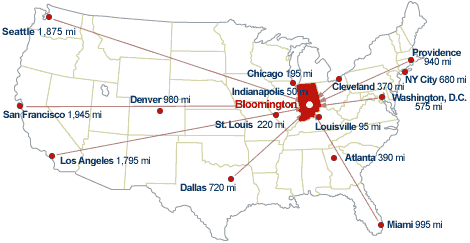
"In the Heart of a Great Country, Beats the Soul of Hoosier Nation." -South Beach Hoosier, 2007
#IUBB, #bannersix
The South Florida I Grew Up In
Excerpts from Joan Didion's Miami, 1987, Simon & Schuster:
In the continuing opera still called, even by Cubans who have now lived the largest part of their lives in this country, el exilo, the exile, meetings at private homes in Miami Beach are seen to have consequences. The actions of individuals are seen to affect events directly. Revolutions and counter-revolutions are framed in the private sector, and the state security apparatus exists exclusively to be enlisted by one or another private player. That this particular political style, indigenous to the Caribbean and to Central America, has now been naturalized in the United States is one reason why, on the flat coastal swamps of South Florida, where the palmettos once blew over the detritus of a dozen failed booms and the hotels were boarded up six months a year, there has evolved since the early New Year's morning in 1959 when Fulgencio Batista flew for the last time out of Havana a settlement of considerable interest, not exactly an American city as American cities have until recently been understood but a tropical capital: long on rumor, short on memory, overbuilt on the chimera of runaway money and referring not to New York or Boston or Los Angeles or Atlanta but to Caracas and Mexico, to Havana and to Bogota and to Paris and Madrid. Of American cities Miami has since 1959 connected only to Washington, which is the peculiarity of both places, and increasingly the warp...
"The general wildness, the eternal labyrinths of waters and marshes, interlocked and apparently neverending; the whole surrounded by interminable swamps... Here I am then in the Floridas, thought I," John James Audobon wrote to the editor of The Monthly American Journal of Geology and Natural Science during the course of an 1831 foray in the territory then still called the Floridas. The place came first, and to touch down there is to begin to understand why at least six administations now have found South Florida so fecund a colony. I never passed through security for a flight to Miami without experiencing a certain weightlessness, the heightened wariness of having left the developed world for a more fluid atmosphere, one in which the native distrust of extreme possibilities that tended to ground the temperate United States in an obeisance to democratic institutions seemed rooted, if at all, only shallowly.
At the gate for such flights the preferred language was already Spanish. Delays were explained by weather in Panama. The very names of the scheduled destinations suggested a world in which many evangelical inclinations had historically been accomodated, many yearnings toward empire indulged...
In this mood Miami seemed not a city at all but a tale, a romance of the tropics, a kind of waking dream in which any possibility could and would be accomodated...
Hallandale Beach Blog
http://www.hallandalebeachblog.blogspot.com/
Hallandale Beach Blog is where I try to inject or otherwise superimpose a degree of accountability, transparency and much-needed insight onto local Broward County government and public policy issues, which I feel is sorely lacking in local media now, despite all the technological advances that have taken place since I grew-up in South Florida in the 1970's. On this blog, I concentrate my energy, enthusiasm, anger, disdain and laser-like attention primarily on the coastal cities of Aventura, Hollywood and Hallandale Beach.
IF you lived in this part of South Florida, you'd ALREADY be in stultifying traffic, be paying higher-than-necessary taxes, and be continually musing about the chronic lack of any real accountability or transparency among not only elected govt. officials, but also of City, County and State employees as well. Collectively, with a few rare exceptions, they couldn't be farther from the sort of strong results-oriented, work-ethic mentality that citizens here deserve and are paying for.
This is particularly true in the town I live in, the City of Hallandale Beach, just north of Aventura and south of Hollywood. There, the Perfect Storm of years of apathy, incompetency and cronyism are all too readily apparent.
It's a city with tremendous potential because of its terrific location and weather, yet its citizens have become numb to its outrages and screw-ups after years of the worst kind of chronic mismanagement and lack of foresight. On a daily basis, they wake up and see the same old problems again that have never being adequately resolved by the city in a logical and responsible fashion. Instead the city government either closes their eyes and hopes you'll forget the problem, or kicks them -once again- further down the road.
I used to ask myself, and not at all rhetorically, "Where are all the enterprising young reporters who want to show through their own hard work and enterprise, what REAL investigative reporting can produce?"
Hearing no response, I decided to start a blog that could do some of these things, taking the p.o.v. of a reasonable-but-skeptical person seeing the situation for the first time.
Someone who wanted questions answered in a honest and forthright fashion that citizens have the right to expect.
Hallandale Beach Blog intends to be a catalyst for positive change. http://www.hallandalebeachblog.blogspot.com/
http://www.hallandalebeachblog.blogspot.com/
Hallandale Beach Blog is where I try to inject or otherwise superimpose a degree of accountability, transparency and much-needed insight onto local Broward County government and public policy issues, which I feel is sorely lacking in local media now, despite all the technological advances that have taken place since I grew-up in South Florida in the 1970's. On this blog, I concentrate my energy, enthusiasm, anger, disdain and laser-like attention primarily on the coastal cities of Aventura, Hollywood and Hallandale Beach.
IF you lived in this part of South Florida, you'd ALREADY be in stultifying traffic, be paying higher-than-necessary taxes, and be continually musing about the chronic lack of any real accountability or transparency among not only elected govt. officials, but also of City, County and State employees as well. Collectively, with a few rare exceptions, they couldn't be farther from the sort of strong results-oriented, work-ethic mentality that citizens here deserve and are paying for.
This is particularly true in the town I live in, the City of Hallandale Beach, just north of Aventura and south of Hollywood. There, the Perfect Storm of years of apathy, incompetency and cronyism are all too readily apparent.
Sadly for its residents, Hallandale Beach is where even the easily-solved or entirely predictable quality-of-life problems are left to fester for YEARS on end, because of myopia, lack of common sense and the unsatisfactory management and coordination of resources and personnel.
It's a city with tremendous potential because of its terrific location and weather, yet its citizens have become numb to its outrages and screw-ups after years of the worst kind of chronic mismanagement and lack of foresight. On a daily basis, they wake up and see the same old problems again that have never being adequately resolved by the city in a logical and responsible fashion. Instead the city government either closes their eyes and hopes you'll forget the problem, or kicks them -once again- further down the road.
I used to ask myself, and not at all rhetorically, "Where are all the enterprising young reporters who want to show through their own hard work and enterprise, what REAL investigative reporting can produce?"
Hearing no response, I decided to start a blog that could do some of these things, taking the p.o.v. of a reasonable-but-skeptical person seeing the situation for the first time.
Someone who wanted questions answered in a honest and forthright fashion that citizens have the right to expect.
Hallandale Beach Blog intends to be a catalyst for positive change. http://www.hallandalebeachblog.blogspot.com/
Hallandale Beach's iconic beachball-colored Water Tower, between beach and A1A/South Ocean Drive
Hollywood in Cartoons, The New Yorker

"Gentlemen, I am happy to announce that as of today we are closing down our Washington news bureau and moving the entire operation to L.A."
Hollywood in Cartoons, The New Yorker
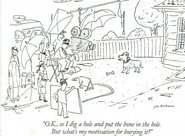
"O.K., so I dig a hole and put the bone in the hole. But what's my motivation for burying it?"
Hollywood in cartoons, 10-21-06 Non-Sequitur by Wiley, www-NON-SEQUITUR.COM

The Magic of Hollywood: A motion has been put forth that we should seek to create rather than imitate. All in favor of killing this silly notion, nod in mindless agreement...
Miami Dolphins

South Beach Hoosier's first Dolphin game at the Orange Bowl came in Dec. 1970, aged 9, a 45-3 win over Buffalo that propelled them into their first ever playoff appearance.
Sebastian the Ibis, the Spirited Mascot of the University of Miami Hurricanes

Before going to my first U-M game at the Orange Bowl in 1972, a friend's father often would bring me home an extra 'Canes game program. That's how I came to have the Alabama at U-M game program from Nov. 16, 1968, which was the first nationally-televised college football night game in color. (A 14-6 loss to the Crimson Tide.) After that first ballgame against Tulane, as l often did for Dolphin games if my father wasn't going, I'd get dropped off at the Levitz parking lot near the 836 & I-95 Cloverleaf in NMB, and catch a Dade County Park & Ride bus, going straight to the Orange Bowl. Onboard, I'd get next to the window and listen to WIOD's pre-game show on my Radio Shack transistor radio. A few times, I was just about the only person onboard besides the bus driver, which was alright by me. Once at the Orange Bowl, if I didn't already have a ticket, I'd buy a game program for myself and one or two for friends or teachers before heading to the ticket window, since you usually couldn't find a program vendor once inside. I probaly had a friend or my father with me for just under 40% of the U-M games I ever went to, but you have to remember that the team, though blessed with several talented players, like Chuck Foreman and Burgess Owens, was just so-so to average at best, and the games were usually played on Friday nights, so it wasn't exactly high on everyone's list of things to do. Depending upon the opponent, if I was alone, I'd often have entire areas of the Orange Bowl to myself. (Wish I had photos of that now!) For instance, I had a good portion of the East (open) End Zone to myself against Oklahoma in the mid-70's, when the Boomer Schooner and the Schooner Crew went out on the field after an Oklahoma TD, and the Schooner received an unsportsmanlike conduct penalty from the refs, as would happen years later in an Orangle Bowl Classic game. (Against FSU?) I was there for the wins and losses under Pete Elliott, Carl Selmer & Lou Saban, and the huge on-field fight in '73 when under eventual national champion Notre Dame (under Ara Parseghian), they called a time-out with less than a minute to go, and already up 37-0. Their rationale? To score another TD and impress the AP football writers; final score 44-0. Well, they got their wish and beat Alabama 24-23 for the title at the Sugar Bowl. A year later, thanks to my Mom's boss, she and I saw Ara's last game as head coach of the Irish in the Orange Bowl Game from the East End Zone -in front of the Alabama cheerleaders!!!- in an exciting 13-11 Notre Dame win over Alabama and Bear Bryant, a rematch of the '73 national title game. I was also present for the U-M's huge 20-15 win under Pete Elliott against Darrel Royal's Texas Longhorns, the week Sports Illustrated's College Football preview issue came out with Texas on the cover, below. I was also present for lots of wins against schools called College of the Pacific, UNLV and Cal-Poly San Luis Obsispo, which I'd then never heard of before.
Miami Dolphins Cheerleaders, April 28, 2007

Photo by Mario J. Bermudez. April 28, 2007 at Dolphins NFL Draft Party at Dolphin HQ, Davie, FL
Of cheerleaders past and present
Given South Florida's unique version of the melting pot -con salsa- demographics and mindset, these women in the photo above are surely what most South Floridians would consider attractive women. But for this observer, who's spent hours & hours at IU cheerleader tryouts and who has known dozens of cheerleaders -and wannabes- in North Miami Beach, Bloomington, Evanston and Washington, D.C., the whole time I was watching these members of the Dolphins' squad perform, I couldn't help but compare them and their routines to those of some IU friends of mine who ALWAYS showed true Hoosier spirit & enthusiasm.
Sitting at my table right near the stage and still later, while watching the long lines of Dolphin fans of all ages waiting to snap photos of themselves with the cheerleaders, I couldn't help but think about those friends who always left me and other Hoosier fans feeling positive & optimistic.
Was there anyone I saw in Davie who possessed these valuable intangibles: the dancing precision of IU Red Stepper -and Captain- Gail Amster, my talented and spirited Phi Beta Kappa pal from Deerfield (IL), who always sat next to me in our Telecom. classes as we took turns entertaining the other; the ebullient spirit & energy of two Hoosier cheerleaders -and captains- from Bloomington, Wendy (Mulholland) Moyle & Sara Cox; the hypnotic, Midwestern, girl-next-door sexiness of Hoosier cheerleader Julie Bymaster, from Brownsburg; or, the adorable Southern girl-next-door appeal of former Hoosier Pom squader Jennifer Grimes, of Louisville, always such a clear distraction while sitting underneath the basket?
Nope, not that I could see. But then they were VERY tough acts to follow!!!
And that's not to mention my talented & spirited friends like Denise Andrews of Portage, Jody Kosanovich of Hammond & Linda Ahlbrand of Chesterton, all of whom were dynamic cheerleaders -and captains- at very large Hoosier high schools that were always in the championship mix, with Denise's team winning the Ind. football championship her senior year when she was captain -just like in a movie. That Denise, Jody & Linda all lived on the same dorm floor, just three stories above me at Briscoe Quad our freshman year, was one of the greatest coincidences -and strokes of luck for me!- that I could've ever hoped for.
You could hardly ask for better ambassadors of IU than THESE very smart, sweet and talented women. In a future SBH post, I'll tell the story of one of the greatest Hoosiers I ever met, the aforementioned Wendy Mulholland, the Bloomington-born captain and emotional heart of the great early '80's IU cheerleading squads, and the daughter of Jack Mulholland, IU's former longtime Treasurer. The acorn doesn't fall far from a tree built on a foundation of integrity & community service!
(After he retired, Mr. Mulholland was the first executive director of the Community Foundation of Bloomington and Monroe County. I used to joke with Wendy that her dad's name was the one that was permanently affixed to the bottom of my work-study checks for years, while I worked at the Dept. of Political Science's Library, first, at the Student Building in the old part of campus, and then later, after it was refurbished, in magnificent Woodburn Hall, my favorite building on campus.)
In that future post, I'll share some reflections on Wendy's great strength of character and personality; my intentions of returning to Bloomington a few weeks before Fall '82 classes started, so I could help Wendy train and work-out to rehab her knee, so she'd feel confident in trying-out for the squad again, following a bad knee injury that'd left her physically-unable to try-out for the squad the previous spring, a big disappointment to those of us who cared about both Wendy and the team; my incredulity at, quite literally, running into Wendy while walking down a sidewalk one afternoon a few years later in Evanston, IL, when we were astonished to discover we were both living there, with me trying to hook on with a Windy City advertising agency, and Wendy then-attending Kellogg (KGSM) at Northwestern, right when the WSJ had named Kellogg the #1 Business School in the country.
I'll also share a story about Wendy performing a true act of kindness towards me in 1982, when I was having a real emergency, and she went above-and-beyond what I had any logical reason to expect. Yet, Wendy, along with her very helpful dad, Jack, came through for me when I was in a very bad time crunch. I've never forgotten Wendy's kindness towards me, and her true Hoosier spirit.
There's NOTHING I wouldn't do for Wendy Mulholland.
It's All About "The U"

South Beach Hoosier's first U-M football game at the Orange Bowl was in 1972, age 11, against Tulane in the infamous "Fifth Down" game. In order to drum up support and attendance for the U-M at the Orange Bowl, that game had a promotion whereby South Florida kids who were school safety patrols could get in for free IF they wore their sash. I did. Clearly they knew that it was better to let kids in for free, knowing their parents would give them money to buy food and souvenirs, perhaps become a fan and want to return for future games. The ballgame made an interesting impression on The New York Times, resulting in this gem from the "View of Sport" column of Oct, 14, 1990, labeled 'Fifth Down or Not, It's Over When It's Over.' -"In 1972, aided by a fifth-down officiating gift in the last moments of the game, Miami of Florida defeated Tulane, 24-21. The country and the world was a much different place that fall because The New York Times took time and space to editorialize on the subject. ''Is it right for sportsmen, particularly young athletes, to be penalized or deprived of the goals for which they earnestly competed because responsible officials make mistakes? The ideal of true sportsmanship would be better served if Miami forfeited last week's game.' South Beach Hoosier hardly needs to tell you that this was YET another New York Times editoral that was completely ignored!
The issue I took with me the night of U-M's 20-15 upset of #1 Texas at the Orange Bowl
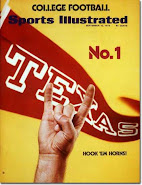
College Football, Texas No. 1, Hook 'em Horns, Sept. 10, 1973. Living in North Miami Beach in the '70's, my Sports Illustrated usually showed up in my mailbox on the Thursday or Friday before the Monday cover date. And was read cover-to-cover by Sunday morning.
The Perfect Storm
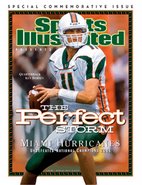
U-M QB Ken Dorsey, Miami Hurricanes Undefeated National Champions 2001, Jan. 2002
Miami's Romp in the Rose
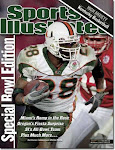
Miami running back Clinton Portis, Jan. 7, 2002
Why the University of Miami should drop football
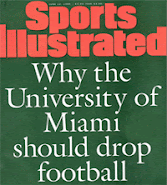
June 12, 1995
REVENGE!
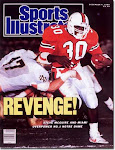
Steve McGuire and Miami Overpower No.1 Notre Dame, Dec. 4, 1989
How Sweet It Is!
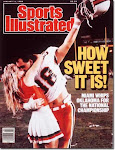
Miami Whips Oklahoma For The National Championship, Pictured: Dennis Kelleher, Jan. 11, 1988
My, Oh My, Miami!
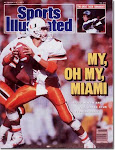
Steve Walsh and the Canes Stun FSU, Oct. 12, 1987
Why Is Miami No. 1?

QB Vinny Testaverde, Nov. 24, 1986
Miracle In Miami
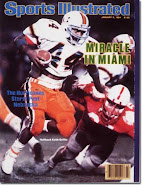
The Hurricanes Storm Past Nebraska, Halfback Keith Griffin, Jan. 9, 1984
Special Issue: College Football
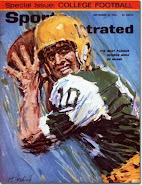
The Best Passer, George Mira of Miami, Sept. 23, 1963
1984 College & Pro Spectatcular

A Pair Of Aces: U-M QB Bernie Kosar & Miami Dolphin QB Dan Marino, Sept. 5, 1984
Pro Football Hall of Fame Special Issue

Dan Marino, Class of 2005, Aug. 2005
FACES OF THE NFL
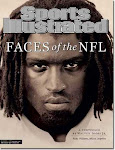
A Portfolio by Walter Iooss Jr., Ricky Williams, Miami Dolphins, Dec. 9, 2002
Coming Back
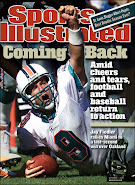
Jay Fiedler rallies Miami to a last-second win over Oakland, Oct. 1, 2001
Dan's Last Stand
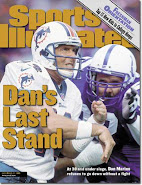
At 38 and under siege, Dan Marino refuses to go down without a fight, Dec. 13, 1999
The War Zone
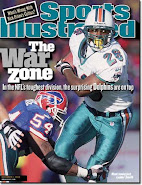
In the NFL's toughest division, the surprising Dolphins are on top, Lamar Smith, Dec. 11, 2000
Down and Dirty
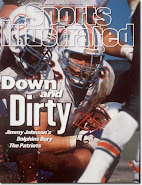
Jimmy Johnson's Dolphins Bury The Patriots, Steve Emtman, Sept. 9, 1996
The Sunshine Boys

Now Playing in Miami: The Dan Marino and Jimmy Johnson Show, May 11, 1996
HOT & NOT
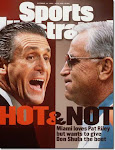
Miami loves Pat Riley but wants to give Don Shula the boot, Dec. 11, 1995
NFL PREVIEW 1995

Which of today's stars are locks for the Hall of Fame? Dan Marino for sure. But who else? To find out, we polled the men who do the voting. Sept. 14, 1995
Sportsman Of The Year
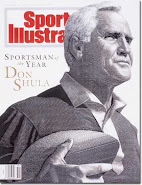
Don Shula, Dec. 20, 1993
Dan The Man
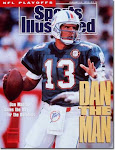
Dan Marino Saves The Day For The Dolphins, Jan. 14, 1991
Dangerous Dan
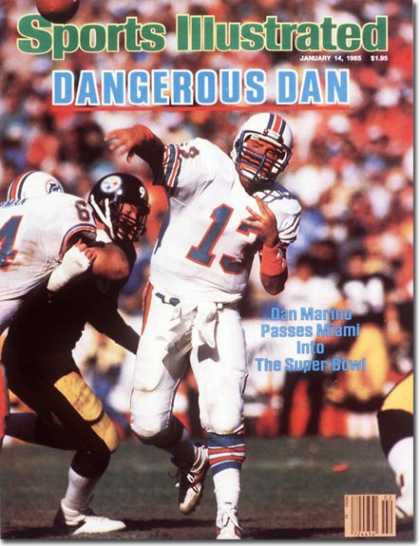
Dan Marino Passes Miami Into The Super Bowl, Jan. 14, 1985
Super Duper!

Wide Receiver Mark Duper Of The Undefeated Dolphins, Nov. 19, 1984
Air Raid! Miami Bombs Washington
+Sep+10,+1984.jpg)
Mark Clayton (burning Darryl Green) Sept. 10, 1984
Rookies On The Rise
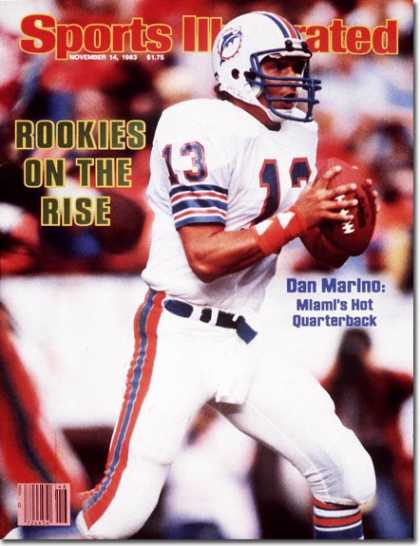
Dan Marino: Miami's Hot Quarterback, Nov. 14, 1983
New Life In The WFL
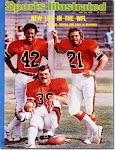
Warfield, Csonka and Kiick of Memphis, July 28, 1975
Zonk! Miami Massacres Minnesota
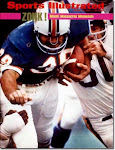
Larry Csonka, Jan. 21, 1974
Pro Football, Miami Is Rough And Ready
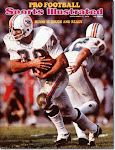
Larry Csonka & Bob Griese, Sept. 17, 1973
Miami All The Way
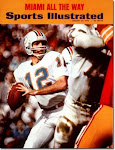
Bob Griese, Jan. 22, 1973
It's Miami and Washington
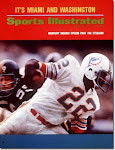
Mercury Morris Speeds Past The Steelers, Jan. 8, 1973
Kiick and Csonka, Miami's Dynamic Duo

Larry Csonka & Jim Kiick, Aug. 7, 1972
Sudden Death at Kansas City
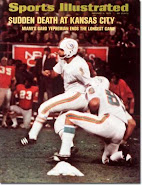
Miami's Garo Yepremian Ends the Longest Game; (kneeling) placekick holder Karl Noonan, Jan. 3, 1972
New Pro in a New Town

Miami's Frank Emanuel, Aug. 8, 1966
Old-style "Obie" the Orange Bowl Committee mascot

The iconic image I grew-up with in Miami, before FedEx got into the picture

